Related Research Articles
In UK politics, the Parliamentary Labour Party (PLP) is the parliamentary group of the Labour Party in Parliament, i.e. Labour MPs as a collective body. Commentators on the British Constitution sometimes draw a distinction between the Labour Party and the Conservative and Liberal parties. The term Parliamentary Labour Party refers to the party in Parliament, whereas the term Labour Party refers to the entire Labour Party, the parliamentary element of which is the PLP.
A crossbencher is a minor party member of some legislatures, such as the British House of Lords and the Parliament of Australia. They take their name from the crossbenches, between and perpendicular to the government and opposition benches, where crossbenchers sit in the chamber.

Sir Graham Stuart Brady is a British politician serving as the Member of Parliament (MP) for Altrincham and Sale West since 1997. A member of the Conservative Party, he has been Chairman of the 1922 Committee since 2010, except for a brief period during the 2019 Conservative Party leadership election.

Richard Haines Burden is a British Labour Party politician who was the Member of Parliament (MP) for Birmingham Northfield from 1992 to 2019. He served as a Shadow Transport Minister from 2013 to 2016 and again from 2016 to 2017. After the 2017 general election, he returned to the backbenches and served as a member of the House of Commons International Development Committee.
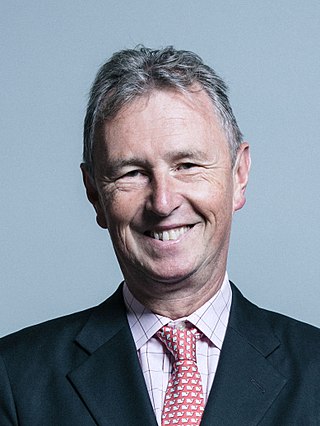
Nigel Martin Evans is a British Conservative Party politician serving as the Member of Parliament (MP) for Ribble Valley in Lancashire since 1992. He was Joint Executive Secretary of the 1922 Committee from 2017 to 2019. He served as First Deputy Chairman of Ways and Means, one of the Speaker's three deputies, from 2010 to 2013. He was elected as Second Deputy Chairman of Ways and Means in 2020.
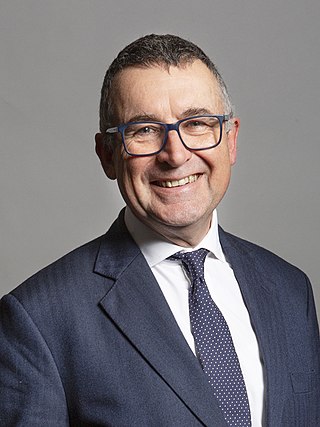
Sir Bernard Christison Jenkin is a British Conservative Party politician serving as Member of Parliament (MP) for Harwich and North Essex since 2010. He also serves as chair of the Liaison Committee. He was first elected to represent Colchester North in 1992, and went on to represent North Essex before the Harwich and North Essex constituency was created.

Christopher Michael Leslie is a debt collection executive and a former British politician who served as the Member of Parliament (MP) for Shipley from 1997 to 2005 and Nottingham East from 2010 to 2019. A former member of the Labour Party, he defected to form Change UK and later became an independent politician.

Robert "Bob" John Walter is a British-Turkish Conservative Party politician. He was the Member of Parliament (MP) for North Dorset from 1997 until he stood down at the 2015 general election.

Sir Robert Goodwill is a British Conservative Party politician and farmer who has served as a Member of Parliament (MP) for Scarborough and Whitby since 2005. He was previously a Member of the European Parliament (MEP) for Yorkshire and the Humber. Goodwill served in Theresa May's government as Minister of State at the Home Office, the Department for Education, and the Department for Environment, Food and Rural Affairs.
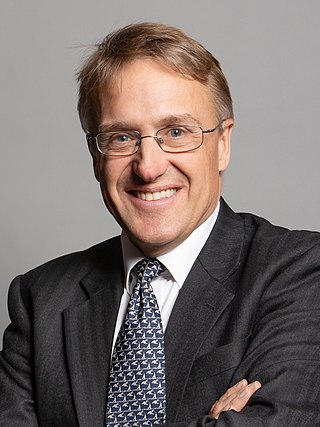
Sir Charles Ashley Rupert Walker is a British politician who served as chair of the House of Commons Procedure Committee from 2012 to 2019. A member of the Conservative Party, he has been Member of Parliament (MP) for Broxbourne in Hertfordshire since 2005.

The 2005 Conservative Party leadership election was called by party leader Michael Howard on 6 May 2005, when he announced that he would be stepping down as Leader of the Conservative Party in the near future following the party's third successive general election defeat. However, he stated that he would not depart until a review of the rules for the leadership election had been conducted, given the high level of dissatisfaction with the current system. Ultimately, no changes were made and the election proceeded with the existing rules, which were introduced in 1998.
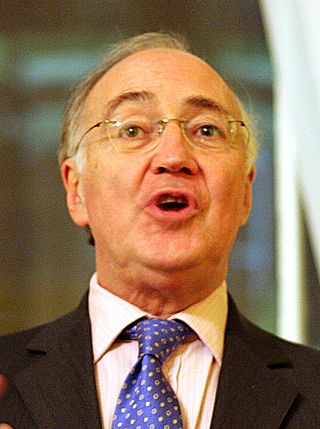
The 2003 Conservative Party leadership election was held due to the enforced resignation of incumbent leader Iain Duncan Smith, who lost a confidence vote among his parliamentary party. The causes of Duncan Smith's fall are often cited as his lack of charisma and impact with the public, the uninspired direction of the party under his leadership, and his previous failure to achieve more than a third of support among members of parliament in the 2001 leadership contest. In the event, the Conservative Party coalesced around Michael Howard as replacement leader and there was not a contest to replace Duncan Smith.

Christopher James Skidmore is a British former Conservative Party politician and author of popular history who served as Member of Parliament (MP) for Kingswood in South Gloucestershire from 2010 to 2024.

Sheryll Murray is a British Conservative Party politician. She was first elected as the Member of Parliament (MP) for South East Cornwall at the 2010 general election.

Graham Thomas Evans, Baron Evans of Rainow is a British politician who served as the Member of Parliament (MP) for Weaver Vale in Cheshire from 2010 until 2017. A member of the Conservative Party, he was appointed to the House of Lords in 2022.
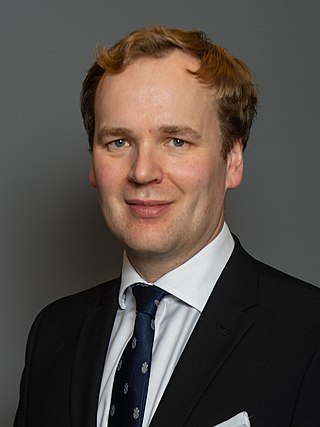
William Peter Wragg is a British politician who has been the Member of Parliament (MP) for Hazel Grove in Greater Manchester since 2015. As a member of the Conservative Party, he previously served as a vice-chairman of its 1922 Committee. Since April 2024 he has sat as an Independent.

Christopher Patrick James Green is a British Conservative Party politician who has served as the Member of Parliament (MP) for Bolton West since 2015. He was elected again in 2017 and 2019, increasing his majority and vote share at both general elections.

On 6 June 2022, a vote of confidence was held amongst Conservative Party MPs on the prime minister, Boris Johnson's, leadership of their party. Johnson won the vote with the support of 211 Conservative members of Parliament, 58.8% of the total. Out of 359 MPs, 148 (41.2%) voted against him.
This is a list of elections in the United Kingdom scheduled to be held in 2022. Included are local elections, by-elections on any level, referendums and internal party elections.
References
- ↑ Phibbs, Harry (20 January 2020). "Brady re-elected Chairman of the 1922 Committee". Conservative Home. Retrieved 20 February 2020.
- ↑ Chaplain, Chloe (8 April 2019). "What is the 1922 Committee, who's its chairman Sir Graham Brady and how is it involved in the no confidence vote?". inews.co.uk. Retrieved 23 May 2019.
- ↑ "The 1922 Committee". Parliament.uk. 12 December 2018. Retrieved 12 December 2018.
- ↑ Eaton, George (11 October 2017). "The 1922 Committee: how the Tories' men in grey suits wield power". New Statesman. Retrieved 25 May 2023.
- ↑ Walker, Peter (6 June 2022). "Boris Johnson to face no confidence vote today as scores of Tory MPs call on him to go". The Guardian. Retrieved 6 June 2022.
- ↑ "Tory leader ousted". BBC. 29 October 2003. Retrieved 23 August 2015.
- ↑ Johnston, Neil (24 May 2019). "Leadership elections: Conservative Party" (PDF). Briefing Paper Number 01366. House of Commons Library. p. 16. Retrieved 24 May 2019.
- ↑ Harris 2013, p.265
- ↑ Ramsden, John (1998). An Appetite for Power: A History of the Conservative Party since 1830. HarperCollins. p. 287. ISBN 0-00-255686-3.
- ↑ "1922 Committee", "Political Notes", The Times, 22 December 1926, p. 12.
- ↑ Borthwick, R. L.; Burch, Martin; Giddings, Philip (2015). "Prime Ministers and their Parties". Churchill to Major: the British prime ministership since 1945. Routledge. pp. 154–55. ISBN 978-1-315-48151-7. OCLC 959427862.
- ↑ Brogan, Benedict; Sylvester, Rachel; Jones, George (17 October 2003). "Duncan Smith loses backing of the 'men in grey suits'". The Daily Telegraph. Retrieved 24 May 2019.
- ↑ Brant, Robin (12 March 2015). "1922 committee and Tory MPs' contact details". BBC News Online. Retrieved 24 May 2019.
- ↑ Rawnsley, Andrew (12 October 2003). "Dead man talking". The Observer. Retrieved 24 May 2019.
- ↑ "Cameron angers MPs with bid to change 1922 Committee". BBC News. 19 May 2010. Retrieved 19 May 2010.
- ↑ "1922 Committee: David Cameron wins vote on rule change". BBC News. 20 May 2010. Retrieved 20 May 2010.
- ↑ Brady elected as Tories' 1922 Committee chairman BBC News 26 May 2010
- ↑ "Tory leadership: Sajid Javid says he 'perhaps' should have resigned from Boris Johnson's cabinet earlier – live". The Guardian. 11 July 2022. Retrieved 11 July 2022.